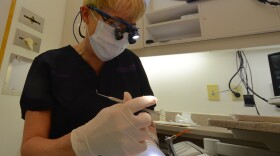-
A study published in the peer-reviewed medical journal Clinical Infectious Diseases finds that in addition to up to half of adults being wrongfully prescribed antibiotics in hospital settings, one in four children given antibiotics in children’s hospitals are prescribed the drugs inappropriately.
-
A common chemical used to kill bacteria is making them more capable of surviving antibiotics.According to new research from Washington University,…
-
In the neonatal intensive care unit at St. Louis Children’s Hospital, doctors and nurses bustled in and out of rooms with small beds and brightly-colored…
-
A St. Louis biotech startup has secured approval from the Food and Drug Administration to sell a device that helps doctors quickly diagnose urinary tract…
-
Ten years ago, Gautam Dantas stumbled across a strange phenomenon in the lab: bacteria that were able to feed on antibiotics.“The story really starts very…
-
When Meredith Littlejohn died, her parents Steve Littlejohn and Stefanie London had spent over a year in and out of the hospital with her for treatment of…
-
Research underway at Washington University seeks to reduce antibiotic use by focusing on a prescriber who doesn’t get too much attention: your local…
-
Researchers at Washington University have found that some multidrug resistant bacteria intentionally get rid of the genes that protect them from…
-
Super bugs — those bacterial diseases that are resistant to antibiotics — are growing, according to a recent World Health Organization report. Not only…
-
Even though organic food has less pesticide residue, a new review of several recent studies finds scant evidence that it has more nutrients or fewer risky bacteria than conventionally grown food. But researchers note that organic agriculture can bring environmental benefits.
Play Live Radio
Next Up:
0:00
0:00
Available On Air Stations










